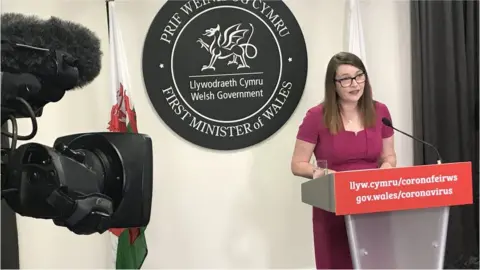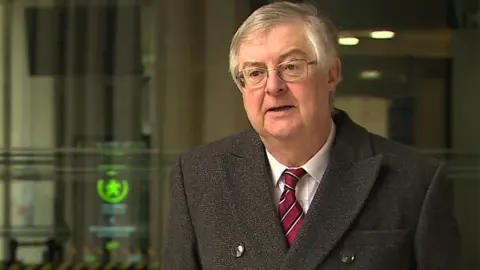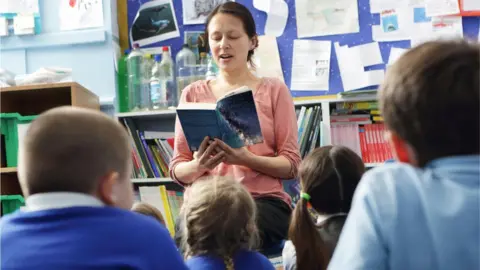Covid: Closing schools in Wales a last resort, says health minister
Closing schools will be a "last resort" that depends on scientific evidence, Wales' health minister has said.
Some schools are due to welcome pupils back this week as the Welsh Government comes under fire from teachers' unions.
Health minister Vaughan Gething said: "If the evidence changes then we'll have to take account of that... and that may lead to a different choice."
Evidence is expected shortly on the new Covid-19 variant, but local authorities have control over schools re-opening.
Under a "flexible" agreement with the Welsh Government some schools are due to open on Wednesday, local authorities said.
First Minister Mark Drakeford has defended this flexibility that leaves the decision with local authorities on when to allow children back to school.
But, unions have threatened legal action because of concerns about the new variant.
At Monday's coronavirus press briefing, Mr Gething said schools will continue with the phased return to face-to-face learning over the first two weeks of the new term unless the "evidence changes".
"The plan is for schools to open in a flexible way… we made a choice before the Christmas break to have this flexible approach to opening, so we can learn and try to understand more of what is happening," he said.
"Now, if we get evidence and advice today, then that is advice we may well need to act upon today or tomorrow."
He stressed that decisions on schools "are always underpinned by evidence".
Closing primary schools "has a real impact on people being able to go to work" and online learning is "practically more difficult" for younger pupils, he added.
Schools have been asked to make provision for vulnerable children and children of key workers while other pupils are taught online until face-to-face teaching resumes.
The Trades' Union Congress - the UK's umbrella union body - has called for parents who are juggling their work lives with childcare should be put on furlough as long as schools are closed.
Plaid Cymru's health spokesman Rhun ap Iorwerth said there had to be as much "advance warning as possible" on any plans to change the return to school.
"I feel for students and I feel for teachers and here we are on the first day of term with a lack of assurance of what's coming down the line," he said.
The Ynys Mon MS said the Welsh Government should make a statement on "what the impact is" of the new variant on schools so that schools can plan.
"It cannot be an end to education - it must be a move to full online education", he added.
What has been happening with schools?

With Covid-19 cases rising in early December, Education Minister Kirsty Williams announced all secondary schools and further education colleges in Wales would move to online learning as part of a "national effort to reduce transmission of coronavirus".
The move was criticised by children's commissioner for Wales Sally Holland, who said it was disruptive to education.
But many parents had already started withdrawing their children from school early due to fears of having to self-isolate over Christmas.
A week later, the Welsh Local Government Association said children would return to school on a staggered basis after the Christmas break, with a full return expected by 18 January.
This sparked outrage from teachers' unions, who said schools would "yet again" have to "pick up the pieces of a last-minute announcement".
What do staff, pupils and parents think?
Amelie Boyce, a sixth form student at Neath College, told BBC Radio Wales Breakfast she had been enjoying online learning and felt "a bit more worried I think for going back to college than I was maybe last term because obviously the virus is a lot more dangerous now".
But she added it was more difficult working in her bedroom at home as "that's the place where I relax most of the time, so it's not really a working environment".
Tim Newbould, head teacher at Penycae Community Primary School in Wrexham, said he had mixed feelings about the return to school, but welcomed the flexibility given by the Welsh Government.
"We don't know yet the impact of Christmas Day," he said.
He added six of his staff had been off following positive Covid tests and "a number of us have been quite poorly, so we're well aware of the risks."
Mr Newbould said absence from school had an obvious impact on pupils' academic progress, but there was also the effect on socialising with peers, "which is really important and has an impact on pupils' mental health and wellbeing".
But he stresses "safety is the key issue", particularly in light of the new variant of the virus, and that teachers and school staff should receive the vaccine early on.
"We simply don't know whether our risk assessments are adequate for the new variant of the virus," he said.
"We're right in front of a large number of pupils at the same time, breathing the same air."
Ceri Reed, from the group Parents Voices in Wales, said many members are worried about the danger of the new variant of the virus.
"I have to admit, we are divided in our group. We represent over 720 parents and carers in Wales, and I think the main concern from those parents who are not considering sending their children into school is because of the new strain," she said.
"We are encouraging parents to look at the science, and we need to applaud what the teachers have done from September onwards with things like track and trace.
"They have been absolutely phenomenal and we believe we can do it again."
What is this latest row about?

On 19 December, Mr Drakeford scrapped plans for a five-day relaxation of lockdown rules over Christmas amid concerns about the spread of a more virulent variant of coronavirus.
Councils pressed on with the plans for a staggered reopening of schools, with the majority of local authorities intending to reopen secondary schools next Monday.
Schools have been asked to make provision for vulnerable children and children of key workers from this week, and all pupils are expected to take part in remote learning before their schools reopen for face-to-face teaching.
On Saturday, the NASUWT teachers' union threatened "appropriate action" to protect teachers, and the head teachers' union NAHT Cymru said it had taken legal action against the Welsh Government to obtain scientific evidence on the risks of the new variant it said it was "withholding".
 Getty Images
Getty ImagesThe National Education Union Cymru had already called for in-person learning to be delayed until at least 18 January.
The unions say more time is needed to assess the risks posed by the new variant and have accused the Welsh Government of "passing the buck" to local authorities.
On Sunday, a joint statement from nine unions called for a national decision on reopening schools rather than leaving it to local councils.
In response, Mr Drakeford said there was "no evidence that young people get the illness more severely as a result of the variant", adding that the Welsh Government's technical advisory group "will be looking at all the evidence again early next week".
However Dilwyn Roberts-Young, general secretary of Undeb Cenedlaethol Athrawon Cymru (UCAC), told BBC Wales Breakfast the evidence around transmission rates in schools did not instil confidence.
"We have listened to the first minister's comments about young people getting the illness more severely," he said.
"Schools aren't in a vacuum - there are adults in the school, there are older pupils, and the Deputy Chief Medical Officer for Wales Dr Chris Jones, said just before Christmas that high numbers of incidents continue to be reported, mainly in residential care homes and school settings.
"Looking at the evidence again... it does not give confidence to parents, to staff or to pupils, and if you look at last March, when the education minister talked about the five guiding principles to determine when schools should return to providing education, there was an emphasis on evidence and information, to ensure that any decisions taken are the correct ones."

- SYMPTOMS: What are they and how to guard against them?
- LOOK-UP TOOL: How many cases in your area?
- GLOBAL SPREAD: How many worldwide cases are there?
- THE R NUMBER: What it means and why it matters

